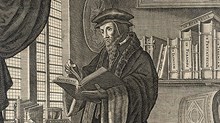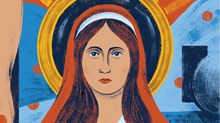“There is not one blade of grass, there is no color in this world that is not intended to make us rejoice.” These words were penned by a man who has been accused of generating a joyless Christianity. He is remembered as the man who taught predestination, an idea repugnant to modern minds. As historian Will Durant complained, “We shall always find it hard to love the man who darkened the human soul with the most absurd and blasphemous conception of God in all the long and honored history of nonsense.”
Yet those who know Calvin well regard him as a saint. Philip Schaff wrote that Calvin “must be reckoned as one of the greatest and best of men whom God raised up in the history of Christianity.”
Calvin’s Geneva
This controversial theologian was born in 1509 in Picardy, part of France. Calvin was brilliant. Initially he intended to be a priest, but his father induced him to study law. Calvin studied at different universities, including Paris, sharpening his already logical mind and avidly reading the Greek and Latin classics.
About 1533 Calvin had what he called a “sudden conversion”: “God subdued and brought my heart to docility.” Apparently he had encountered the writings of Luther. He broke from Catholicism, left France, and settled in Switzerland as an exile.
In 1536, in Basel, Calvin published the first edition of one of the greatest religious works ever written, The Institutes of the Christian Religion. The title, perhaps better translated as “Principles of the Christian Faith,” introduced a book designed to “hand on some elementary teaching by which anyone who had been touched by an interest in religion might be formed to true godliness.” At the age of 27, Calvin had already produced a systematic theology, a clear defense of Reformation teachings.
His writings impressed people, including Guillaume Farel, a reformer in Geneva, Switzerland. On his way to Strasbourg, Calvin stopped overnight in Geneva. When Farel learned that the author of the Institutes was in town, he sought him out and pled with him to stay and help the church in Geneva. Calvin refused, wanting only a quiet life of study. So Farel swore a curse on Calvin’s studies unless he stayed. “I felt as if God from heaven had laid his hand on me,” Calvin said, and Geneva was to be his home (with one brief exile) until he died in 1564.
Calvin pastored the St. Pierre church, preaching almost daily. He produced commentaries on almost every book of the Bible and wrote dozens of devotional and doctrinal pamphlets. (He managed to do all this while constantly battling various ailments, including migraine headaches.) He also married and fathered a child. Sadly, his wife died young, as did their son. Calvin refused to remarry, feeling his work would keep him busy. It did.
Calvin wanted Geneva, a city of notoriously lax morals, to be a holy city. His influence was felt everywhere, notably in the schools. He urged excommunicating church members whose lives did not conform to spiritual standards, and every citizen of Geneva had to subscribe to his confession of faith.
Some balked at the moral restrictions, but Geneva became a moral magnet, attracting Protestant exiles from all over Europe. One, John Knox, described Geneva as “the most perfect school of Christ since the days of the apostles.”
Calvin’s Institutes
What is so grand about the Institutes? For one thing, no other reformer ever stated Protestant beliefs so systematically. Calvin’s book, which he kept enlarging throughout his life, covered all the bases. The first edition of Calvin’s Institutes, a slim volume of only 6 chapters, was revised and expanded by Calvin five times; the final 1559 edition contained 79 chapters. It is largely the Institutes that has caused Calvin to be considered “one of the great seminal minds … in the development of Western culture and civilization.”
Calvin, ever logical, took a logical starting point: the Apostle’s Creed, accepted by all Christians. He saw that it has four major points: “I believe in God the Father … Jesus Christ … the Holy Spirit … the holy catholic church.” Those are the four divisions of the Institutes. Drawing on his wide reading, and building on the work of other reformers, Calvin stated a theology and its practical application in church life.
Book III of the Institutes has received much attention. In considering the Holy Spirit, Calvin examined the question of regeneration—that is, How are we saved? He claimed that salvation is possible only through the grace of God. Even before creation God chose some people to be saved. This is the bone most people choke on: predestination. Curiously, it isn’t particularly a Calvinist idea. Luther believed it, as did most of the other reformers. Yet Calvin held it so absolutely and stated it so forcefully that the teaching is forever identified with him.
For Calvin, God was—above all else—sovereign. Calvin’s constant theme was this: If you are saved, it is God’s doing, not your own. God alone knows who is elect (saved) and who isn’t.
But, Calvin said, a moral life shows that a person is (probably) one of the elect. Calvin himself, an intensely moral and energetic man, impressed on others the need to work out their salvation—not to be saved, but to show they are saved.
Calvin’s Institutes also set forth the presbyterian system of church order. Book IV of the Institutes describes a church under the guidance of elders (presbuteroi in Greek), moral leaders elected by the church. Other orders of ministry are pastor, doctor (teacher), and deacon. With modifications, this system is still followed in churches called Presbyterian or Reformed.
In emphasizing God’s sovereignty, Calvin’s Institutes also leads the reader to believe that no person—king or bishop—can demand our ultimate loyalty. Calvin never taught a right to revolution, but his teaching laid the groundwork for this idea. In this sense his works are amazingly “modern,” and he is regarded as a father of democracy.
Calvin’s Influence
A single article cannot do justice to Calvin’s influence. Calvin’s theology found a home in places as far apart as Scotland, Poland, Holland, and America. Volumes have been written about him, some applauding him, some calling him a puritanical fiend. But it is safe to say that few Christians have been more brilliant, more energetic, more sincere, more moral, and more dedicated to the purity of the Christian church.
Copyright © 1990 by the author or Christianity Today/Christian History magazine.
Click here for reprint information on Christian History.

Support Our Work
Subscribe to CT for less than $4.25/month




























